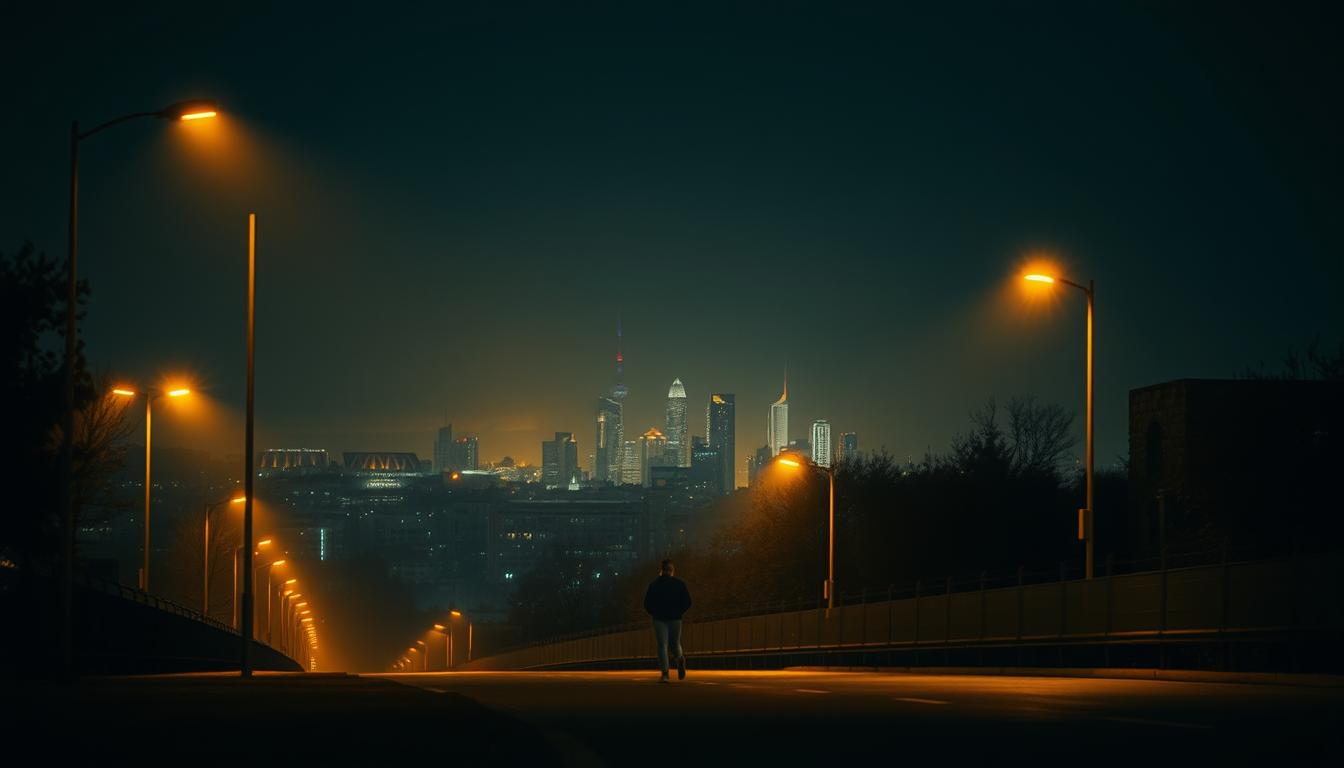Our lives are now filled with screens and LED bulbs. We use smartphones and office lights that didn’t exist before. These bright lights mess with our natural sleep cycles.
This constant light exposure is a problem our bodies weren’t made for. It’s a big issue for millions of Americans every day.
Most people don’t know how much screen time in the evening affects their sleep. Our bodies struggle to keep up with this modern lifestyle.
Poor sleep can affect more than just how tired we feel the next day. It can also mess with our mood, focus, and immune system. Many people feel tired all the time without knowing why.
It’s worrying how common this is in our society. People often think being tired is just part of modern life. But, these problems often come from our use of evening light and disrupted sleep.
Understanding Circadian Rhythms
Knowing how your body’s natural rhythms work is key to understanding health challenges from artificial light. Your internal clock affects hunger, focus, and more. It’s a system that has evolved over millions of years to keep you in sync with day and night.
What are Circadian Rhythms?
Circadian rhythms are your body’s 24-hour cycles that control sleep, wakefulness, and other processes. They manage your body temperature and hormone releases. Think of them as your body’s conductor.
These rhythms don’t just control sleep. They also affect mood, energy, and healing. They repeat every 24 hours, hence the name “circadian.”
The Science Behind Circadian Clocks
In your brain, a tiny cluster called the suprachiasmatic nucleus acts as your master clock. It gets light information from your eyes and coordinates your body’s clocks.
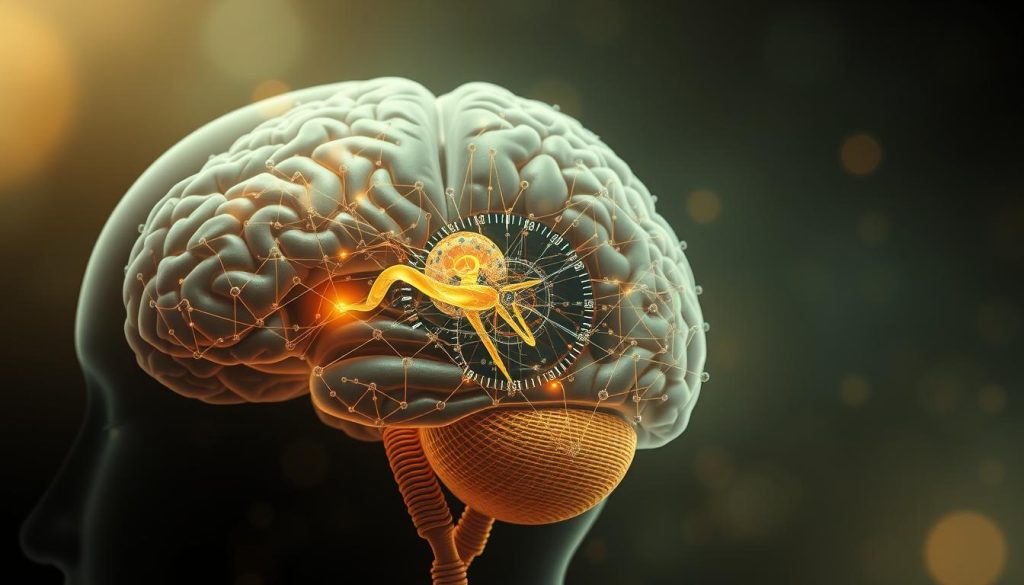
Every cell in your body has its own molecular clock. These clocks work together under your brain’s guidance. When they work well, your body stays in perfect timing.
Scientists found that specific genes control these clocks. These “clock genes” turn on and off in patterns. This explains why circadian rhythms are crucial for health.
How Light Influences Sleep Patterns
Light is the main signal for your circadian rhythms. Bright light tells your brain it’s day. Natural sunlight is perfect for keeping your clock in sync.
Morning light helps you wake up. Evening light makes your brain produce melatonin. But artificial light can mess with this balance.
Blue light, found in LED lights and screens, is especially bad for sleep. Even a little blue light can affect your sleep preparation.
The Impact of Artificial Light
Artificial light has changed our lives in big ways. It affects our bodies in ways we’re still learning about. The move from natural light to artificial light has brought new health issues.
Artificial light and our health are linked in complex ways. We’re exposed to light all day, from screens in the morning to devices at night. This can mess with our sleep and overall health.
Sources of Artificial Light in Daily Life
Our world is full of artificial light. Smartphones, tablets, and computers are big sources of blue light. We use them from waking up to bedtime.
LED lights are everywhere because they save energy and last long. But they give off more blue light than old bulbs. This includes lights above us, on our desks, and even for decoration.
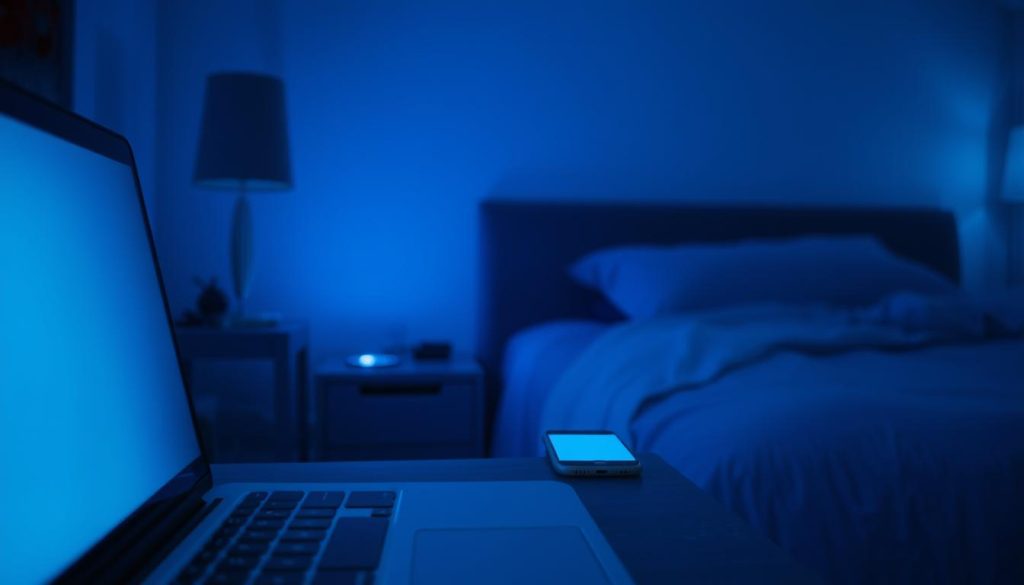
We also get artificial light from outside. Car headlights, street lamps, and signs add to our light exposure. Even night lights in our homes can mess with our sleep.
TVs and gaming devices also give off a lot of blue light. These bright screens can interfere with our sleep, especially in the evening.
How Blue Light Affects Your Health
Blue light in the evening can cut melatonin levels by up to 50 percent. Melatonin is key for sleep and protects our cells. Less melatonin can harm our health in many ways.
When we’re exposed to blue light in the evening, it tricks our brain into thinking it’s still day. This makes it harder to fall asleep and can make our sleep worse.
LED lights make this problem worse because they give off more blue light. We’re exposed to more of this light all day. This can lead to needing more caffeine and sleep aids to feel awake and rested.
Circadian Disruption and Sleep Quality
Sleep problems from disrupted circadian rhythms affect millions in the U.S. But, many don’t see the big picture. Artificial light messing with our natural sleep cycle leads to health issues beyond just feeling tired. It affects our energy, mood, and overall well-being.
Many struggle with concentration, mood swings, and fatigue due to sleep issues. Knowing this helps us see why fixing our circadian rhythms is key to health.
Symptoms of Circadian Disruption
Spotting signs of circadian disruption is crucial. These signs can sneak up on you, making them seem like normal stress or aging.
Common signs include trouble falling asleep, waking up too early, and feeling tired but wired. You might also notice energy crashes, trouble focusing, and mood swings.
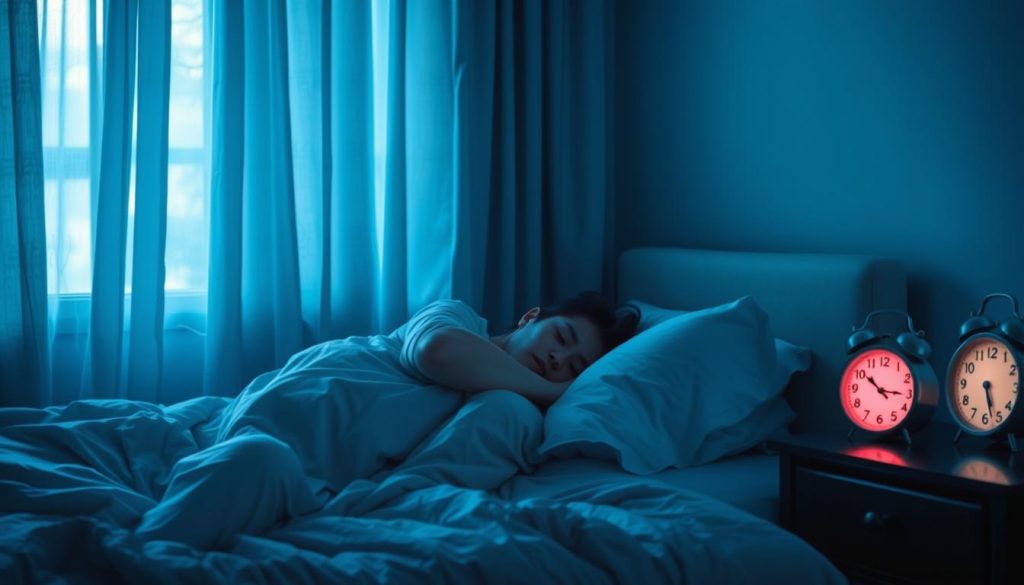
- Afternoon energy crashes that leave you feeling drained
- Difficulty concentrating during important tasks
- Changes in appetite and unusual food cravings
- Digestive problems that seem unrelated to diet
- Increased susceptibility to getting sick
Ignoring these signs can make things worse. Many turn to caffeine, which can worsen the problem.
The Connection Between Sleep and Mood
The link between disrupted circadian rhythms and mood is clear. Poor sleep affects brain chemicals that control mood and emotional balance.
Chronic sleep issues can lead to more anxiety and depression. Many don’t connect their mood swings to sleep. The brain needs quality sleep to make serotonin and dopamine.
Stress hormones also get out of balance. Elevated cortisol levels make sleep harder, leading to more emotional challenges:
- Increased irritability and short temper
- Difficulty managing daily stressors
- Reduced emotional resilience
- Problems with memory and decision-making
To break this cycle, we must tackle the root cause. Understanding how artificial light affects our sleep is the first step to better mood and sleep.
Modern Lifestyle Factors Contributing to Disruption
Today’s way of living has changed how we see light and dark. Our daily activities often clash with our natural sleep cycles. This has led to sleep problems for many people, no matter their age or job.
Technology, work hours, and changes in our environment are big challenges. Knowing about these issues helps us understand why sleep quality is a big problem today.
The Role of Technology and Screens
Digital devices are a big part of our lives, exposing us to artificial light all day. Americans spend over seven hours a day looking at screens. This happens even in the evening, when our bodies should be getting ready for sleep.
Screen time in the evening is common in many homes. Families use phones, tablets, and TVs during dinner and downtime. This blue light can mess with our melatonin levels.
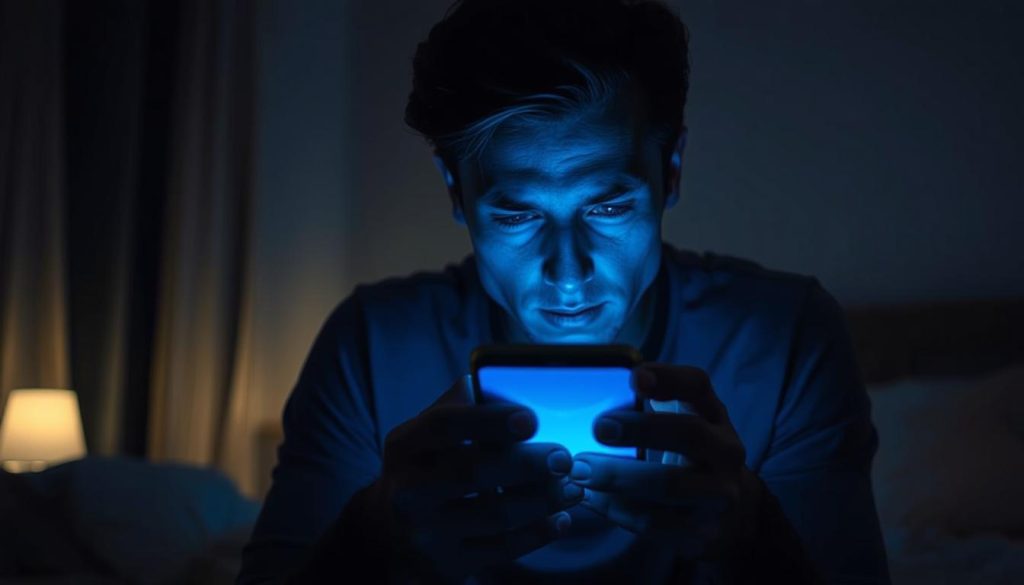
It’s not just about personal device use. Many people check emails, scroll through social media, or watch videos before bed. This keeps their brains awake when they should be relaxing.
Shift Work and Its Challenges
Many Americans work non-traditional hours, disrupting their natural sleep patterns. Night shifts force people to stay awake when their bodies want to sleep. This messes up their internal clocks.
Healthcare, manufacturing, and security workers often face bright lights during their shifts. This confuses their body’s clock even more. Even on days off, they often have trouble sleeping normally.
Shift work sleep disorder can harm brain function and immune health. It makes people feel tired even after sleeping. So, they use caffeine and other stimulants to stay awake.
Environmental Factors Influencing Light Exposure
City lights can make it hard to sleep well. Streetlights, security lights, and businesses open all night create constant light. This light can get into bedrooms and mess with sleep.
Today, homes have more artificial light than ever. Neighbor’s lights, signs, and commercial buildings glow all night. This makes it hard to get the natural darkness our bodies need.
Indoor lighting has also changed a lot. LED bulbs and energy-saving lights give off more blue light than old bulbs. This affects our sleep cycles, even when we try to relax at home.
Strategies to Mitigate Circadian Disruption
Simple steps can help you get back to natural sleep patterns, even in a world filled with light pollution. You don’t need to make big changes to protect your circadian rhythms. Small tweaks to your daily routine can greatly improve your sleep and health.
Creating a plan involves three main areas: cutting down on bad light, getting more good natural light, and using sleep aids wisely. These steps help your body’s natural rhythm and fight the impact of modern lighting on your sleep.
Implementing Light Reduction Techniques
Fighting light pollution starts with “light hygiene” practices. This means being careful about when and how you use artificial light, especially at night.
Wearing blue light filtering glasses or using screen apps can help reduce melatonin suppression in the evening. Many devices now have night mode features that change color temperature as bedtime nears.
Your bedroom is key for healthy sleep. Blackout curtains, eye masks, and covering LED lights can help your body produce melatonin better.
- Use warm-colored LED bulbs in bedrooms and living areas
- Install dimmer switches to gradually reduce light intensity
- Establish a “digital sunset” routine one hour before bedtime
- Cover or remove bright LED displays from electronics
The Benefits of Natural Light Exposure
Getting natural light at the right times can help you resist artificial light later. Morning and early afternoon sunlight strengthens your circadian rhythms and boosts sleep quality.
Morning walks, eating lunch outside, or working near a window gives you natural light. This simple change can greatly help your sleep-wake cycles.
Even on cloudy days, outdoor light is brighter than indoor light. Just 15-30 minutes of morning light can reset your internal clock and boost energy all day.
Using Sleep Aids Wisely
Melatonin supplements can be helpful, but use them wisely. The goal is to support your body’s natural melatonin, not replace it.
Timing is key when taking melatonin supplements. Take them 30-60 minutes before bed to signal sleep time. But, using them too much without fixing light issues can make them less effective.
Other natural methods work well with light management. Keeping regular sleep times, a cool bedroom, and avoiding caffeine and alcohol at night can improve your circadian health without supplements.
The Future of Light and Health Research
Scientists are discovering new things about artificial light and how it affects our bodies. They are looking into ways to lessen the negative impacts of modern lighting on our sleep. This could change how we live and work.
Emerging Studies on Artificial Light
Recent studies show timing is key. Researchers at Harvard Medical School found that even a little blue light before bed can mess with our internal clocks. They are now working on light therapy that fits each person’s sleep and genes.
They are also studying how different light affects our metabolism and immune system. This could help shift workers and people with sleep issues.
Potential Innovations for Better Sleep Health
Smart lighting systems that change throughout the day are becoming popular. They mimic natural sunlight to help our bodies stay in sync indoors. Wearable devices now track our light exposure and give us tips.
Soon, homes and offices will have lighting that’s good for our circadian rhythms. App developers are making tools that block harmful blue light from screens at the right times. These advancements give us hope for better sleep in our digital world.

